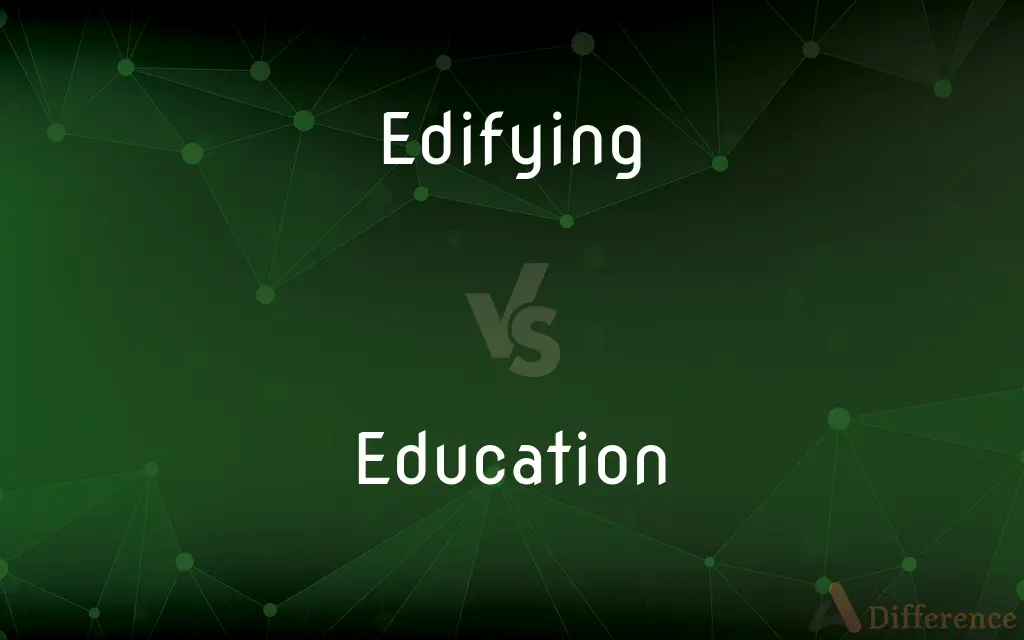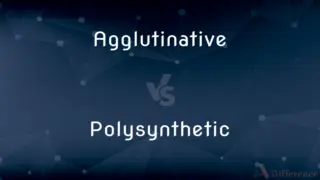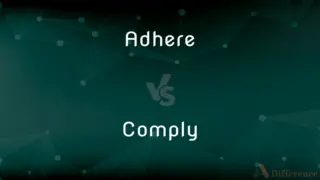Edifying vs. Education — What's the Difference?
By Tayyaba Rehman — Updated on September 27, 2023
Edifying refers to providing moral or intellectual instruction or improvement. Education is a systematic process of facilitating learning, acquiring knowledge, skills, values, beliefs, and habits.

Difference Between Edifying and Education
Table of Contents
ADVERTISEMENT
Key Differences
Edifying and education, though seemingly related due to their association with learning and enlightenment, have unique differences. Edifying pertains to the action or process of imparting moral or intellectual enlightenment, aimed at improving the mind or character of an individual. Education, in contrast, denotes a structured and systematic process designed to impart knowledge, skills, values, beliefs, and habits, often through teaching, training, or research.
Edifying, in its essence, is inherently moral or ethical, focusing on improvement and enlightenment of character and morals. It is usually informal, arising from individual interactions, experiences, or reflections. Education, however, is more formal and structured, typically provided by institutions designed for teaching and learning, such as schools and universities, encompassing a broad range of subjects and disciplines.
While edifying usually results from enlightening conversations, readings, or experiences that morally or intellectually uplift an individual, education is generally achieved through a predefined curriculum, learning objectives, and assessments, designed to impart specific knowledge and skills. Education seeks to equip individuals with the necessary knowledge and skills to navigate and contribute to the world, while edifying primarily aims at moral and spiritual upliftment.
Edifying can occur at any moment and in any place where there is an opportunity for moral or intellectual improvement. It doesn’t necessarily follow a set structure or pattern and is more spontaneous. In contrast, education is often methodical and occurs within a defined framework, involving a deliberate and concerted effort to facilitate learning, typically requiring a more substantial investment of time and resources.
Comparison Chart
Definition
Providing moral or intellectual improvement or instruction.
A process of facilitating learning, acquiring knowledge, skills, values, and habits.
ADVERTISEMENT
Structure
Informal and can be spontaneous.
Formal, structured, and methodical.
Focus
Moral and intellectual enlightenment.
Acquisition of knowledge, skills, values, and beliefs.
Method
Arises from enlightening conversations, experiences, or reflections.
Involves teaching, training, or research, usually within educational institutions.
Range of Application
Primarily aimed at individual improvement and enlightenment.
Covers a broad range of subjects and disciplines.
Compare with Definitions
Edifying
Providing moral or intellectual instruction or improvement.
The conversation was truly edifying, leaving us all with much to ponder.
Education
An enlightening experience, acquiring knowledge, and developing skills.
Traveling can be a form of education.
Edifying
Instructive in such a way as to improve morally and intellectually.
The lecture was deeply edifying and opened our eyes to new perspectives.
Education
The process of receiving or giving systematic instruction.
His education was interrupted by his time in the military.
Edifying
Serving to enlighten or uplift.
Her story was not only inspiring but also edifying.
Education
The field of study concerned with pedagogy and development of knowledge.
She pursued a degree in education.
Edifying
Beneficial to the intellectual or moral qualities of an individual.
Listening to the wise words of the elder was an edifying experience.
Education
A social science that encompasses teaching and learning specific skills.
Education is a powerful tool for personal development.
Edifying
To instruct especially so as to encourage intellectual, moral, or spiritual improvement.
Education
Education is the process of facilitating learning, or the acquisition of knowledge, skills, values, morals, beliefs, and habits. Educational methods include teaching, training, storytelling, discussion and directed research.
Edifying
That educates, informs, illuminates or instructs.
Education
The act or process of educating or being educated.
Edifying
That enlightens or uplifts.
Education
The knowledge or skill obtained or developed by a learning process.
Edifying
Present participle of edify
Education
A program of instruction of a specified kind or level
Driver education.
A college education.
Edifying
Edification
Education
The field of study that is concerned with the pedagogy of teaching and learning.
Edifying
Instructing; improving; as, an edifying conversation.
Education
An instructive or enlightening experience
Her work in an animal shelter was a real education.
Edifying
Enlightening or uplifting so as to encourage intellectual or moral improvement;
The paintings in the church served an edifying purpose even for those who could not read
Education
(uncountable) The process of imparting knowledge, skill and judgment.
Good education is essential for a well-run society.
Edifying
Contributing to the improvement of the mind or character.
The book is as entertaining as it is edifying.
Education
(countable) Facts, skills and ideas that have been learned, especially through formal instruction.
He has had a classical education.
The educations our children receive depend on their economic status.
Education
The act or process of educating; the result of educating, as determined by the knowledge skill, or discipline of character, acquired; also, the act or process of training by a prescribed or customary course of study or discipline; as, an education for the bar or the pulpit; he has finished his education.
To prepare us for complete living is the function which education has to discharge.
Education
The activities of educating or instructing or teaching; activities that impart knowledge or skill;
He received no formal education
Our instruction was carefully programmed
Good teaching is seldom rewarded
Education
Knowledge acquired by learning and instruction;
It was clear that he had a very broad education
Education
The gradual process of acquiring knowledge;
Education is a preparation for life
A girl's education was less important than a boy's
Education
The profession of teaching (especially at a school or college or university)
Education
The result of good upbringing (especially knowledge of correct social behavior);
A woman of breeding and refinement
Education
The United States federal department that administers all federal programs dealing with education (including federal aid to educational institutions and students); created 1979
Education
The act or process of imparting or acquiring general knowledge.
The education system needs reforms to address contemporary needs.
Common Curiosities
Can edifying occur spontaneously?
Yes, edifying can occur spontaneously, anywhere there is an opportunity for moral or intellectual improvement.
Is edifying usually informal?
Yes, edifying is usually informal and can arise from individual interactions, experiences, or reflections.
Is education a structured process?
Yes, education is a structured and systematic process, often provided by formal institutions.
Can edifying result from enlightening conversations?
Absolutely, edifying can result from enlightening conversations that provide moral or intellectual improvement.
What does edifying primarily focus on?
Edifying primarily focuses on providing moral or intellectual instruction or improvement.
What is the main purpose of education?
The main purpose of education is to facilitate learning, acquiring knowledge, skills, values, beliefs, and habits.
Is edifying inherently moral or ethical?
Yes, edifying is inherently moral or ethical, focusing on the improvement of character and morals.
Is a substantial investment of time and resources often required in education?
Yes, education often requires a substantial investment of time and resources, especially in formal settings.
Can reading be considered an edifying experience?
Yes, reading can be considered an edifying experience as it can provide moral or intellectual instruction or improvement.
Does education encompass a broad range of subjects?
Yes, education encompasses a broad range of subjects and disciplines, including both arts and sciences.
Does edifying primarily aim at individual improvement?
Yes, edifying primarily aims at individual moral and intellectual improvement and enlightenment.
Is the process of education methodical?
Yes, the process of education is typically methodical, occurring within a defined framework and involving deliberate effort.
Does education usually follow a curriculum?
Yes, education usually involves a predefined curriculum, learning objectives, and assessments.
Can edifying experiences uplift an individual’s spirit?
Yes, edifying experiences can uplift an individual’s spirit by enlightening and improving their moral and intellectual qualities.
Is education mainly acquired through formal institutions?
While education is often acquired through formal institutions, it can also be obtained through self-study and experience.
Share Your Discovery

Previous Comparison
Agglutinative vs. Polysynthetic
Next Comparison
Adhere vs. ComplyAuthor Spotlight
Written by
Tayyaba RehmanTayyaba Rehman is a distinguished writer, currently serving as a primary contributor to askdifference.com. As a researcher in semantics and etymology, Tayyaba's passion for the complexity of languages and their distinctions has found a perfect home on the platform. Tayyaba delves into the intricacies of language, distinguishing between commonly confused words and phrases, thereby providing clarity for readers worldwide.
















































